
Unclaimed Money Lookup - Wisconsin
Free Wisconsin Unclaimed Money Lookup
We receive referral fees from partners (advertising disclosure)
The information we provide you is free of charge and a result of extensive research by our home warranty experts. We use affiliate links on our site that provide us with referral commissions. While this fact may not influence the information we provide, it may affect the positioning of this information.
(advertising disclosure)
The information we provide you is free of charge and a result of extensive research by our home warranty experts. We use affiliate links on our site that provide us with referral commissions. While this fact may not influence the information we provide, it may affect the positioning of this information.

Wisconsin Unclaimed Money -
The Ultimate Guide 2026
- UPDATED February 2026
If you think that you have unclaimed money in Wisconsin, use our ultimate guide to find out what type of money there is and how to claim it.

Contents
- Unclaimed Property in Wisconsin
- What is Unclaimed Property?
- What is the Value of Unclaimed Assets in Wisconsin?
- Conducting the Unclaimed Property Search in Wisconsin
- Wisconsin Unclaimed Money Finder
- What are the Unclaimed Property Laws in Wisconsin?
- Other Alternatives to Search for Unclaimed Property Other than the Wisconsin State Database
- Preventing My Assets from Becoming Unclaimed/Lost

Unclaimed Property in Wisconsin
The Department of Revenue of the State of Wisconsin is in charge of unclaimed money in Wisconsin. The state’s unclaimed property website allows you to search for unclaimed property.
We always recommend starting your unclaimed property search at your particular state’s unclaimed assets page, regardless of where you currently live. Every state in the U.S. has its unique unclaimed funds page, where individuals can look for all property escheated to their jurisdiction.

The majority of unclaimed moneys are usually placed in custody of the state where the legal owner last lived. However, we strongly advise you not to end your unclaimed property search at the page for your state. Instead, consider it the beginning of your search.
The Department of Revenue of the State of Wisconsin is the guardian of uncollected property in the state. Wisconsin features one of the shortest contractual time limits, with property designated as unrecovered after a year of no action and the holder losing contact with the proprietor.
Once property is identified as unclaimed, Wisconsin state takes quite significant steps to reconnect it with its owners, including newspaper advertising, trying to match unclaimed asset owners’ names with official records, attempting to identify unclaimed property owners by use of tax records, as well as maintaining an easy to use online database where individuals can browse for unclaimed property.
Whether this is your first time looking for unclaimed money or you’re a seasoned pro, it is highly likely that there are some details that you lack in making the most of your search. This handy guide will provide you with all the insights you need in your search for abandoned assets.
What is Unclaimed Property?
Unclaimed property is defined differently in each state. Unclaimed property in the state of Wisconsin refers to any financial or monetary asset with zero owner activity for a duration spanning one year or more, and the legal asset’s holder seems unable to get a hold of the owner. The unclaimed property law in Wisconsin law exempts real estate as part of unclaimed property. In the state of Wisconsin, examples of unclaimed properties include matured life insurance policies, uncashed checks, credit balances, deposits, overpayments, balances, refunds, mutual funds, stocks, savings, checking accounts, overpayments and uncashed dividend checks.

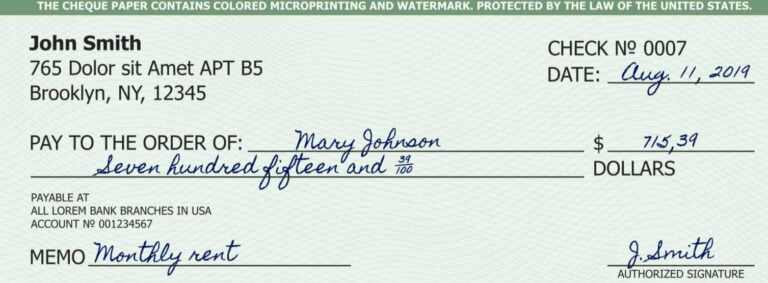
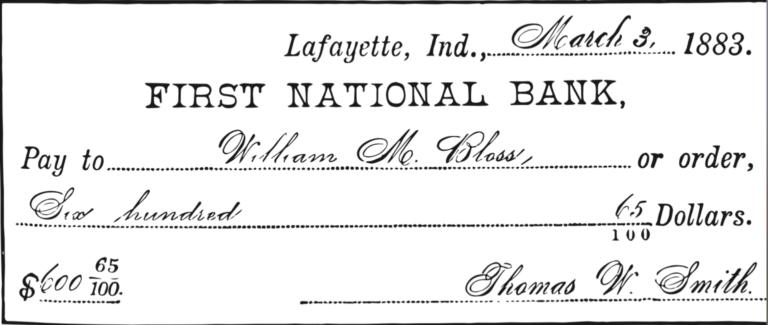
What is the Value of Unclaimed Assets in Wisconsin?
Wisconsin had returned over $117 million in unclaimed assets as at the year 2017. The state does not disclose the exact amount it holds currently, seeing as the figure is always changing. In fact, as new property gets constantly reported as unclaimed and other assets get claimed, the amount of unclaimed assets remains as a constantly fluctuating figure across the country.
In spite of that continuous flux, the National Association of Unclaimed Property Administrators (NAUPA)-a body dedicated to pursuing unclaimed money and returning it to the rightful owners across the United States- can estimate the total value of unclaimed funds in the United States. Presently, its estimate stands at about $42 billion.
Conducting the Unclaimed Property Search in Wisconsin
The Wisconsin State Department of Revenue makes it simple and painless to search for unclaimed assets. You should broaden your search to increase the chances of landing at property you might have abandoned. Other states, not just the ones where you’ve lived, but anywhere you might have assets, should be included.
Furthermore, certain types of property do not escheat to the state. In order to locate those assets, you’ll need to look through some databases that are held at the national level, or managed by the federal government. Knowing you’ll have to search multiple websites can be daunting, but this guide will walk you through the entire unclaimed asset search process.
Wisconsin Unclaimed Money Finder
Wisconsin state’s unclaimed property finder is found at the Wisconsin’s Department of Revenue website: https://tap.revenue.wi.gov/UCPSearch/_/
However, there is some property that is usually held at county-level. One example of this is the property held by courts. Usually, all the counties in the state of Wisconsin usually remit their unclaimed assets to the state.
These counties include: Adams, Ashland, Barron, Bayfield, Brown, Buffalo, Burnett, Calumet, Chippewa, Clark, Columbia, Crawford, Dane, Dodge, Door, Douglas, Dunn, Eau Claire, Florence, Fond Du Lac, Forest, Grant, Green, Green Lake, Iowa, Iron, Jackson, Jefferson, Juneau, Kenosha, Kewaunee, La Crosse, Lafayette, Landglade, Lincoln, Minitowoc, Marathon, Marinette, Marquette, Menominee, Milwaukee, Monroe, Oconto, Oneida, Outagamie, Ozaukee, Pepin, Pierce, Polk, Portage, Price, Racine, Richland, Rock, Rusk, St. Croix, Sauk, Sawyer, Shawano, Sheboygan, Taylor, Trempealeau, Vernon, Vilas, Walworth, Washburn, Washington, Waukesha, Waupaca, Waushara, Winnebago, and Wood.
Below are the steps you need to follow:
Provide your surname/business name, middle name first name, and property ID in the relevant field as shown below, then click on the ‘Select’ icon. For business searches, be sure to use business variations such as Corp, Corporation, etc. in order to expand the search results.
That may be all the information that you need to input in order to get started with a search. However, it might not necessarily suffice to narrow your search. This is particularly true in the case of a common last name. Running your search with ‘Smith’ as the last name leaves you a message saying “250 Properties found. Refine your search.” In real sense, this number is low, but it would help if the results were a bit narrowed down.
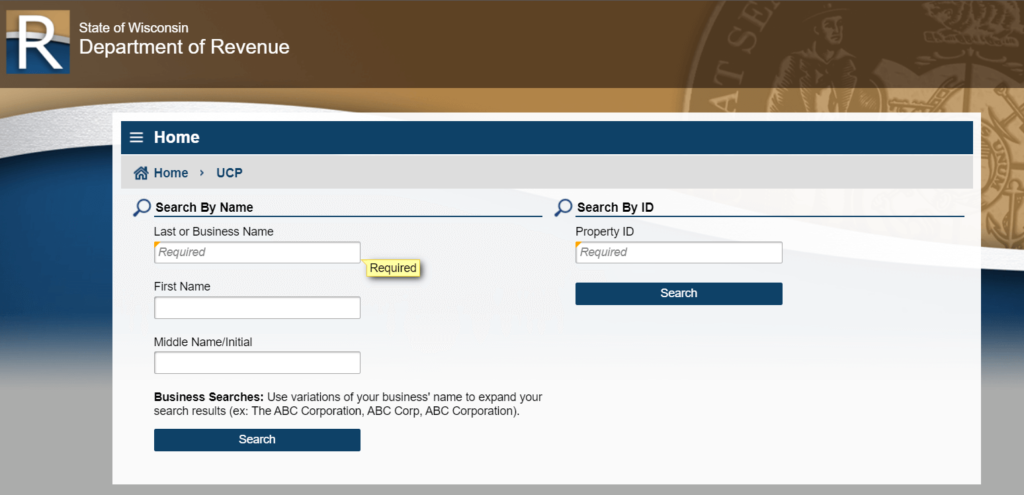
As an example we have used the name ‘John Smith’.
It is advisable to use as much information as possible. A search for ‘Smith’ only could lead to over 250 results. Agreeably, going through all these details could be majorly hectic. Adding the name ‘John’ helps in narrowing down the search results to just 23 searches.
While Wisconsin’s search functions do not allow you to narrow down the property search by address or city, it does include those details in the results that are returned to you. As a result, you can look up addresses, cities and holder information as well.
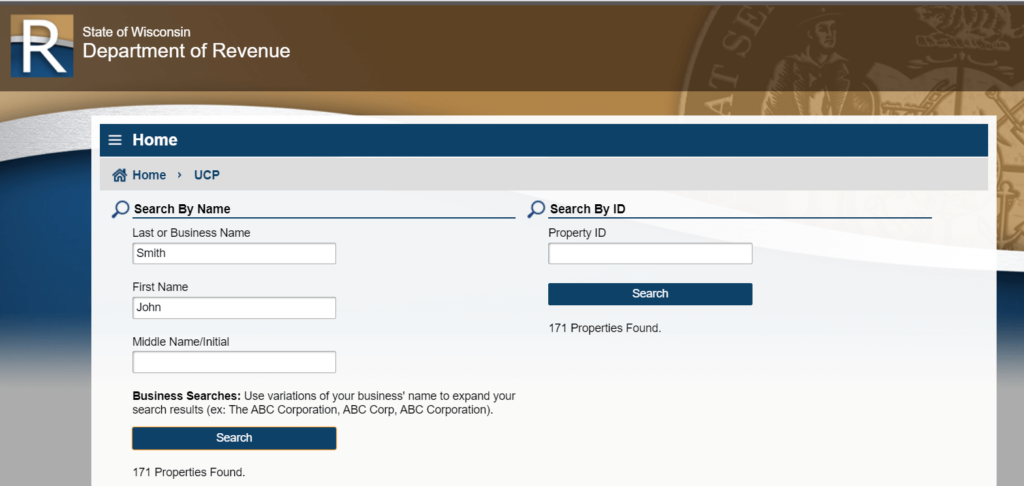
As soon as you have the entire list of results, scan it to check if there are any properties on it that you own. One useful tip is to look for all of your addresses, whether known or unknown, because the last known address that a holder could have for you may not necessarily be your accurate last known address.
To choose a claim, click on the “select” button immediately on the left hand side of every listed property description. After you’ve selected all of the assets you would wish to claim, go to the bottom of the page and click the “claim properties” button:

Check to see if the asset is being claimed by a lawful property owner or a property finder/locator service provider, then move on to the next step.
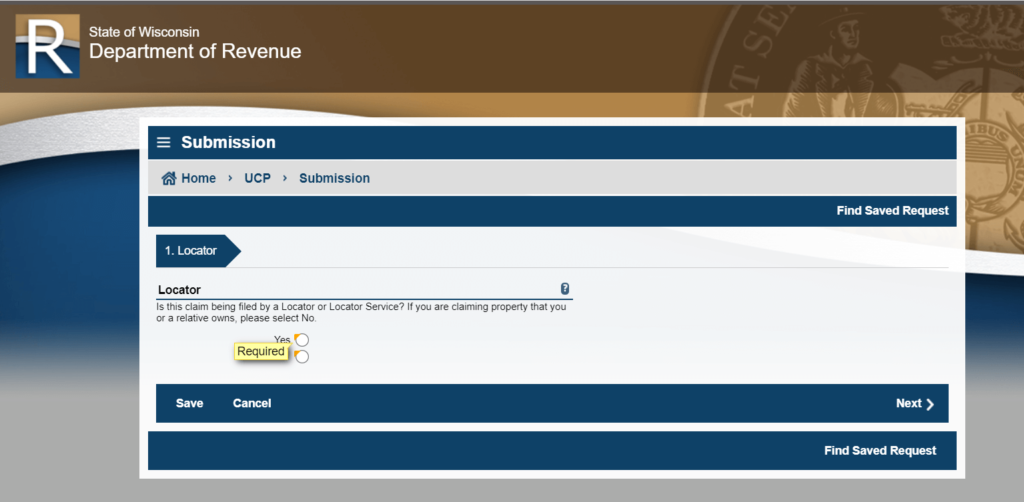
If you are the owner select ‘No’ and proceed. The opposite applies.
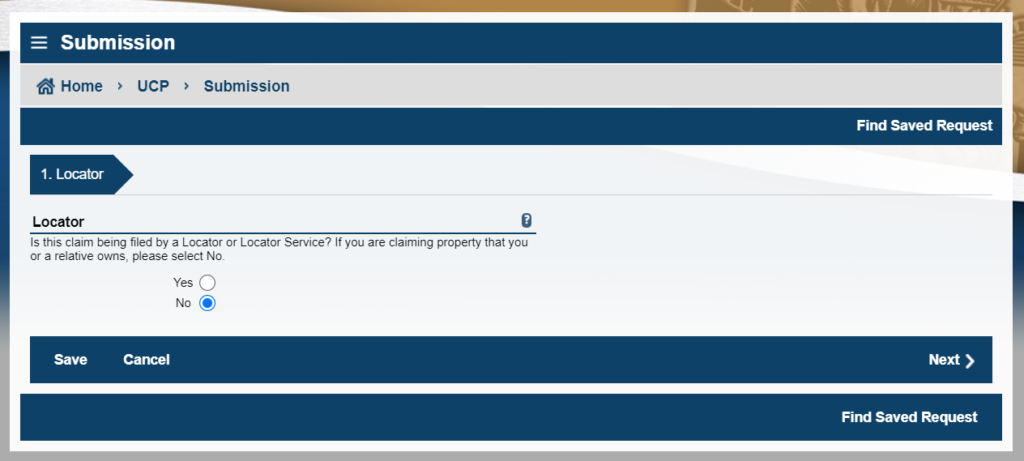
Proceed to the next step after selecting your relationship to the owner of the unclaimed property in question (the options are personal representative, guardian, reported owner, heir, government, creditor and uniform gift to minors).
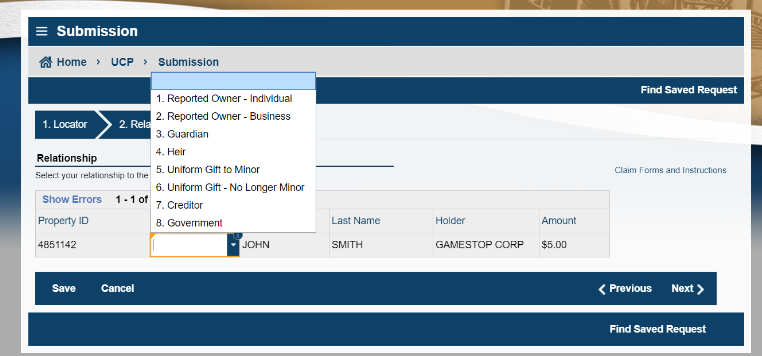
You’ll be taken to a screen where you’ll be asked to provide more personal details including, your Surname, your first name, your Social Security Number, your Wisconsin driver’s license number, your date of birth, your phone number, your active email address, and your current address. This is after you have selected your claim’s relationship. Make sure you double-check your address.
After you’ve submitted your claim, you’ll be told what kind of evidence or documentation you’ll need to prove ownership and your identity. In most cases, you’ll need to show proof that you lived at the property’s associated address. If you don’t have proof of that particular address, you can get a copy of your credit report, which will usually include your address for the past two years.
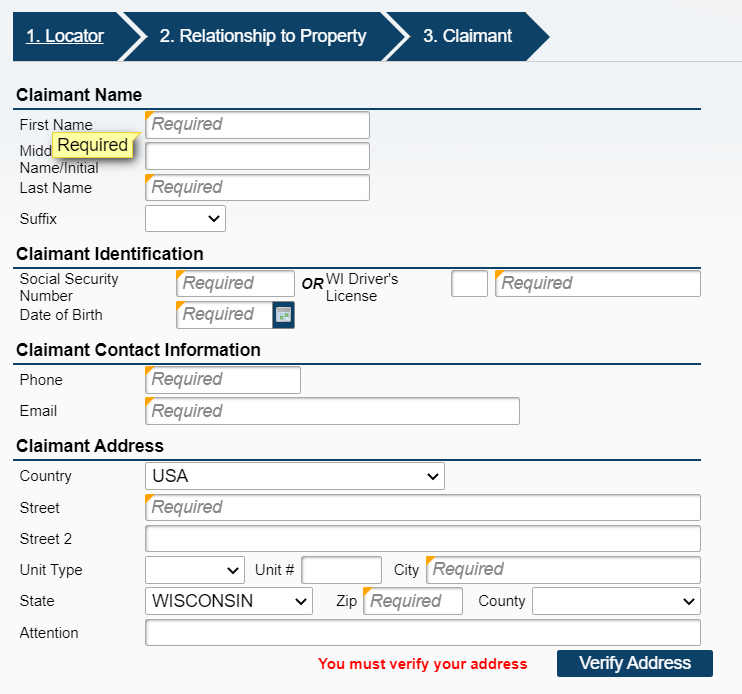
What are the Unclaimed Property Laws in Wisconsin?
The Unclaimed property law that generally applies in the state of Wisconsin is the Uniform Unclaimed Property Act, which is found in Wisconsin’s state Code Chapter 117. For more information on the laws that apply, visit their website.
Other Alternatives to Search for Unclaimed Property Other than the Wisconsin State Database
After you complete your unclaimed property search in Wisconsin state’s database, you might want to expand your search. This would mean that you look into other non-state databases. In making your decision on what state to get started with first, think in the line of your potential contacts as opposed to limiting your thinking to places you’ve lived before. As such be sure to take into account states in which your insurer or previous employer may have previously been located, as well as states where your close relatives once lived.
If you are considering a non-state website to conduct your property search, consider funds that are not held by the state. This should include funds that are guaranteed or held by the federal government. Some sites that you could consider include: the National Pension Benefit Guaranty Corporation, the Life Insurance Policy Locator, the US Treasury, and the Internal Revenue Service.
The Internal Revenue Service would be a great start especially if you do not plan on visiting any other site. This is due to the fact that the IRS has a tendency of holding on to its funds. Thus, as a taxpayer, or an individual related to taxpayers in one way or the other, there will be relevant information to your unclaimed property.

Another important source of unclaimed property information is the United States savings bonds which are usually held by the national treasury. The treasury previously had a seamless system that allowed citizens to search for all their abandoned bonds. However, once they revamped their system, the option was omitted. Today, the process is slightly complicated. You have three options; writing to the Bureau of Public Debt, visiting the Treasury website directly, or calling the relevant department via 844-284-2676. Wisconsin state has more than $17B in unclaimed bonds. As such conducting this search is worth all the while.
While the federal government is not responsible for holding pensions, the Pension Benefit Guaranty Corporation guarantees them. This body holds more than $400M in unclaimed pensions for more than 70,000 potential claimants in Wisconsin. Be sure to visit the site to see if there are any pension benefits due to you.
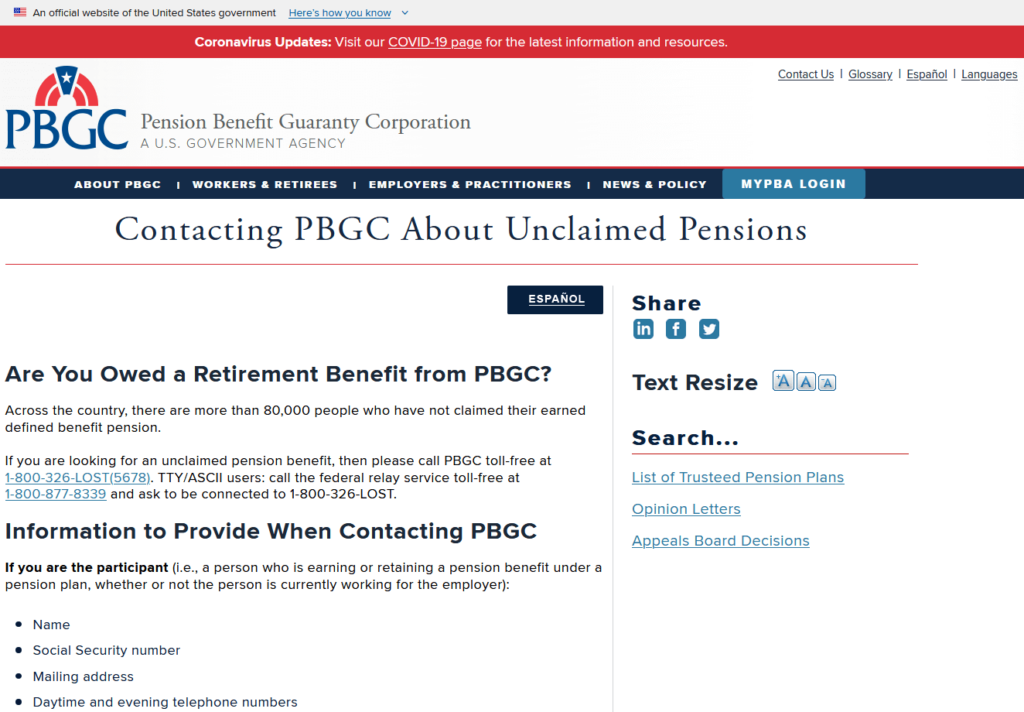
The final site that is worth paying a visit is a non-state website. While it lacks a searchable database, the National Association of Insurance Commissioners’ Life Insurance Policy Locator Service is an important start. This is actually a group of insurance providers and companies. Here, Wisconsin state residents can key in their information. The companies then disseminate these details to their member agencies. The agencies then cross check the details against their files to try and establish if there could be any unpaid policies to which you are the beneficiary.

Preventing My Assets from Becoming Unclaimed/Lost
In as much as property owners will always end up getting their unclaimed property or assets back, it would be ideal not to have the assets lost or abandoned in the first place. Losing track of your money or assets is actually easier and faster than you may actually realize. This is especially so if the funds in question are small in value. However, these small amounts tend to accumulate, adding up to become valuable assets. To avoid these moneys getting lost, there are a couple of things that you could do, especially when you open up a new account.
One step that you can take is keeping detailed account records in a single location. For each account that you own, be sure to keep identifying details including: your user name at account registration, the account number, as well as the holder’s name & contact information. In case you have a deposit that is due, or if an entity (say an insurance company) owes you money and they need to pay it by a certain date, be sure to note it down in your records somewhere.
If the asset is tangible property, for instance assets held in a safety deposit box, or if the property is held in a physical location, be sure to note this location down, alongside any associated box number and how you can access it. Another crucial thing to do is getting a trusted person and designating them with the role of locating the property in case of death or incapacitation. Share with them the information on how they can locate the said asset.
Finally, be sure to keep in touch with your property holders. In the state of Wisconsin, a period of one year without any activity on the property can trigger unclaimed asset laws. As such it would be in your best interest to set reminders, to ensure that you contact your property holder at least once in a year. More importantly, in case you make any changes to crucial information, for example your name, physical address, phone number, or marital status, be sure to update your property holder.
Wisconsin Unclaimed Property FAQs
For how long does the state of Wisconsin hold abandoned, lost or unclaimed property?
Usually the Department of Revenue of Wisconsin doesn’t take any possession of unclaimed assets. Rather, it acts as a perpetual property custodian until the funds are claimed. This means that there is no set time limit within which individuals should place their claims. However, when it comes to property falling under the §863.37 or 852.01 category, a special exception applies. With such kind of assets, there is a statute of limitations (spanning 10 years) for all asset claims.
What are some common examples of unclaimed funds?
In the state of Wisconsin, almost all property types can become unclaimed assets. The only exception there is to this is real estate. Other property types include matured life insurance policies, uncashed checks, credit balances, deposits, overpayments, balances, refunds, mutual funds, stocks, savings, checking accounts, overpayments and uncashed dividend checks.
Does Wisconsin as a state make any efforts to locate property owners in a bid to connect them to their lost, abandoned or unclaimed property?
Yes. Wisconsin state makes use of 4 primary methods to try and locate unclaimed asset owners; matching up unclaimed money with their owners by way of searching the public record database, newspaper advertisements, maintaining a seamless and easy to use online ‘unclaimed property’ database, as well as making use of tax records to match owners with their unclaimed funds. Usually property owners get a notification from the state’s Department of Revenue in case of a property match.
How can I make sure that my heirs get to know where my property is in case I die?
Most people would presume that a will is enough. However, that is not the case. While a will is a very crucial document when it comes to property inheritance, its most important role is helping your heirs know how to divide the assets. It doesn’t do much in communicating where the assets are. What you can do is getting a trusted individual who can help your beneficiaries to locate the assets in question. In most cases, the trusted individual happens to be a legal administrator. Your choice of representative is quite important; it has to be an individual with some level of integrity.
How come the state of Wisconsin takes possession of abandoned, lost or unclaimed funds?
In 1970, Wisconsin state enacted the unclaimed property law. This law gave a centralized location which would allow state residents to search and claim their funds and other assets. The goal of the law was increasing the number of legal property owners who got reunited with their unclaimed funds by the state.
Should I hire a finder to conduct the search?
When it comes to property finder services, there is a lot of uncertainty that surrounds it. The worry among most people is whether getting a property finder is a wise decision. The thing is, property finders do offer legitimate services. However, just as is the case with businesses that require you to provide personal information, you need to exercise a lot of caution. Ensure that you do your due diligence before you settle for a property locator professional. One way to do this is confirming that they have documents from the state that authorize them to conduct their business.
Ultimately the choice to use a property finder is very personal. Wisconsin state does not charge you any fee to search and claim your unclaimed assets. With a property finder, you will need to pay a small fee for their service. The fee, in most cases, is a percentage of the funds being recovered. Agreeably, searching for unclaimed property from the state database can be somewhat time-consuming. At the end of the day, the decision to hire a property finder to save time lies entirely up to you.
Conclusion
The state of Wisconsin records billions of dollars in unclaimed property or funds, all waiting to get into the hands of their legal owners. If you suspect that there could be some unclaimed assets that are waiting for you, chances are that you are right. Our comprehensive guide above is aimed at helping you have a happy ‘reunion’ with your missing dollars.
Quickly Search For Unclaimed Money
Disclaimer: OurPublicRecords mission is to give people easy and affordable access to public record information, but OurPublicRecords does not provide private investigator services or consumer reports, and is not a consumer reporting agency per the Fair Credit Reporting Act. You may not use our site or service or the information provided to make decisions about employment, admission, consumer credit, insurance, tenant screening, or any other purpose that would require FCRA compliance.